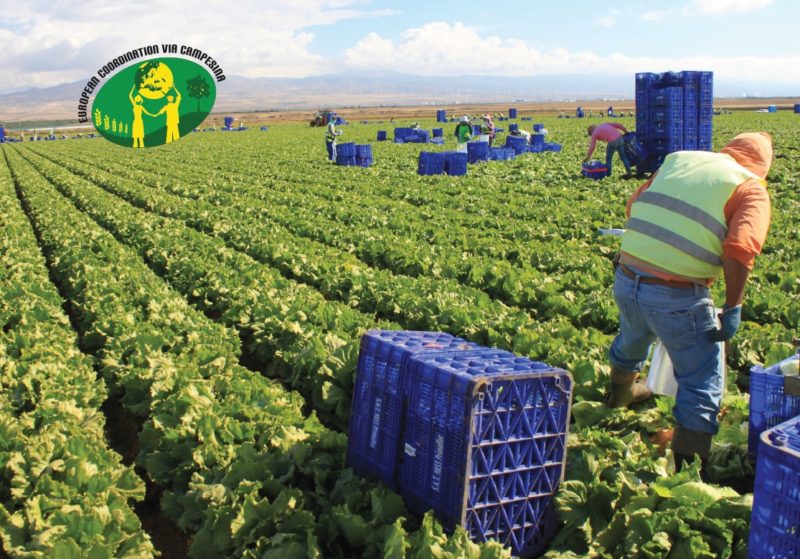Press release Brussels, 28 Nov 2019
The violation of agricultural migrant workers’ rights across the Mediterranean: The role of labour intermediaries
New ECVC publication shows how utilitarian migration policies that discriminate against and exploit foreign workers are turning many agricultural regions in Europe into no-rights zones
Brussels, 28 November 2019 – The message coming from Andalucia’s strawberry fields was clear: You complain, you get fired. You’re forced out of the EU. Last year, after filing a complaint against employers and foremen for sexual assault and labour violations, close to 100 women from Morocco working as strawberry pickers in Southern Spain were expelled and sent back to their home country. Although possibly the most mediatised case of its kind, this incident is actually just the latest example of a reoccurring trend across Europe’s agricultural fields: the exploitation of migrant workers in almost complete impunity.
Yet, in Huelva as in several other cases, a major element is often overlooked: The role played by labour intermediaries[1] in the abuse and exploitation of workers. In the case of the strawberry pickers of Andalucía, it was the EU that funded the recruitment venture of these women (15 000 female workers in 2018), which it outsourced to a Moroccan employment agency. To ensure exemplary temporary migration, instructions were given to recruit the cheapest and most vulnerable categories of society: rural women with children, who can only understand Arabic.
The publication launched today by ECVC argues that with European migration regimes as their backdrop[2], intermediation schemes like these worsen the working and living conditions of agricultural workers by creating a relationship of dependence on employers and/or intermediaries.
“Sowing Injustice, Harvesting Despair: Abuse and Exploitation of Foreign Agricultural Workers” is the result of more than 10 years of fieldwork within ECVC, supported by a network of researchers. By presenting and analysing different labour intermediation schemes in four Mediterranean countries (France, Spain, Italy and Morocco), this publication reveals the troublesome connection between 1) the expansion of the industrial model of agriculture in the Mediterranean region, 2) the intermediation schemes at their service and 3) the increased vulnerability and exploitation of migrant agricultural workers.
To conclude, the study shows, in the one hand, the fight led by agricultural workers in their territories, and, on the other hand, puts on the table a series of short and long-term solutions to address the violation of the rights of migrant workers in this sector; this includes a proposal to introduce social conditionality principles in the subsidies paid through the EU’s Common Agricultural Policy.
“Embedded in a system of generalised competition in global markets, the agroindustry requires an ever-increasing pool of flexible and cheap labour,” says Nadia Azouagagh from Andalucia’s SOC-SAT trade union. “To this end, EU legal provisions allow national labour legislation to be circumvented, to the benefit of intermediaries, and nearly always to the detriment of workers, particularly migrants, resulting in the systemic and structural violation of fundamental rights such as the right to a fair income, the right to appropriate working conditions, the right to movement, and the prohibitions of slavery and forced labour.”
The size and dependency on this agricultural workforce is considerable: In Italy, 55% of seasonal work is done by migrant workers. 28,9% of the agricultural workforce of Andalucía, yet 73,1% in cities like Huelva. In certain EU countries, there’s even the desire to make asylum seekers available to agri-food employers.
“All over Europe, migrants face serious human and labour rights violations in the agricultural sector. This report is a means of taking a stand against this and mobilizing future actions.” Says Federico Pacheco, of ECVC’s Coordinating Committee and head of ECVC’s migrant rural labour working group, “Ending this trend of exploitation will require, first and foremost, social, labour and immigration policies based on the unrestricted respect for the rights of migrant and agricultural workers. And all this must be done within a radical reorientation of the agri-food production and distribution systems, away from the economy of exploitation of resources and human beings that is promoted by the agroindustrial model, and rather towards Peasant agriculture and food sovereignty.”
ECVC’s report, “Sowing Injustice, Harvesting Despair: Abuse and Exploitation of Foreign Agricultural Workers”, is available in French and English , and will soon be available in Spanish.
Contact
- Federico Pacheco – ECVC Coordination Committee : +34 690 6510 46 (FR, ES)
- Cristina Brovia – ECVC Migrant Rural Labour Working Group : +39 377 684 0085 (FR, IT, EN)
- Nadia Azouagagh – Sindicato de Obreros del Campo (SOC-SAT)- ECVC : +34 630 25 41 13 (ES, AR)
- Romain Balandier – La Confédération Paysanne – ECVC : +33 613 3818 28 (FR)
[1] There are three main forms of labour intermediation schemes: government schemes for introducing foreign labour, private intermediation schemes (e.g. temporary employment agencies) and informal intermediation schemes (e.g. Caporalato). These different forms can coexist in the same territory and play a complementary role within the same labour force system.
[2] European migration regimes create either a captive legal status or a lack of, thus are a major lever behind the precariousness of migrant workers.
Photo credit: SOC -SAT

